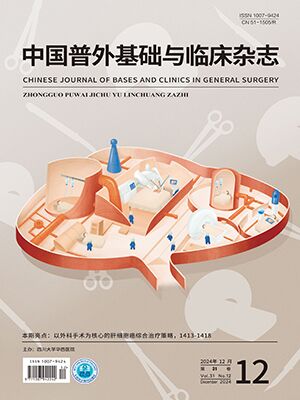| 1. |
王宁, 刘硕, 杨雷, 等. 2018 全球癌症统计报告解读. 肿瘤综合治疗电子杂志, 2019, 5(1): 87-97.
|
| 2. |
朱渝军, 陈刚, 胡佳, 等. 腹腔镜与开腹手术治疗结直肠癌的临床疗效及术后并发症的比较. 实用癌症杂志, 2016, 31(1): 103-106.
|
| 3. |
刘启志, 郝立强, 楼征, 等. 结直肠癌术后早期和晚期复发转移与临床病理特征的关系. 中华普通外科杂志, 2019, 34(8): 675-678.
|
| 4. |
胡俊. MRI在直肠癌术前精准分期及精准定位评估中的应用. 吉林大学, 2019.
|
| 5. |
路成文, 张彬. CT、MR 对盆腔结、直肠癌术前 TN 分期的应用价值. 医学影像学杂志, 2015, 25(7): 1204-1208, 1220.
|
| 6. |
覃罗, 姚晖, 徐亮. 中性粒细胞与淋巴细胞比值联合检测纤维蛋白原对结直肠癌预后的判断价值. 中国免疫学杂志, 2017, 33(4): 527-532.
|
| 7. |
Li X, Guo D, Chu L, et al. Potential diagnostic value of combining inflammatory cell ratios with carcinoembryonic antigen for colorectal cancer. Cancer Manag Res, 2019, 11: 9631-9640.
|
| 8. |
汪晓东, 刘丹, 吕东昊, 等. 术前纤维蛋白原水平与结直肠癌病理分期的关系. 中华实用诊断与治疗杂志, 2009, 23(7): 643-645.
|
| 9. |
廖存, 马辉, 阮国添, 等. 435 例结直肠癌患者术前血清前白蛋白水平与肿瘤的临床病理特征的关系研究. 结直肠肛门外科, 2019, 25(3): 284-288, 293.
|
| 10. |
孙帆. 纤维蛋白原与前白蛋白比值在结直肠癌诊断及预后中的应用价值. 南昌大学, 2018.
|
| 11. |
姚宏伟, 吴鸿伟, 刘荫华. 美国癌症联合委员会第八版结直肠癌分期更新及其“预后和预测”评价体系. 中华胃肠外科杂志, 2017, 20(1): 24-27.
|
| 12. |
Ullman TA, Itzkowitz SH. Intestinal inflammation and cancer. Gastroenterology, 2011, 140(6): 1807-1816.
|
| 13. |
季畅, 李艳华. 慢性炎症细胞因子表达与结直肠癌相关性分析. 中国实验诊断学, 2020, 24(4): 626-627.
|
| 14. |
丁一波, 陈一凡, 曹广文. 癌症进化发育学的新证据: 结直肠癌和肝细胞癌的研究发现. 中国癌症防治杂志, 2020, 12(1): 1-5.
|
| 15. |
Li MX, Liu XM, Zhang XF, et al. Prognostic role of neutrophil-to-lymphocyte ratio in colorectal cancer: a systematic review and meta-analysis. Int J Cancer, 2014, 134(10): 2403-2413.
|
| 16. |
Fülöp ZZ, Gurzu S, Fülöp RL, et al. Prognostic impact of the neutrophil-to-lymphocyte and lymphocyte-to-monocyte ratio, in patients with rectal cancer: A retrospective study of 1 052 patients. J Pers Med, 2020, 10(4): 173.
|
| 17. |
彭维忠, 杨浩洁, 张克兰, 等. 外周血 NLR 或 PLR 与结直肠癌预后的相关性研究进展. 中国免疫学杂志, 2017, 33(12): 1902-1906.
|
| 18. |
Peng HX, Yang L, He BS, et al. Combination of preoperative NLR, PLR and CEA could increase the diagnostic efficacy for Ⅰ-Ⅲ stage CRC. J Clin Lab Anal, 2017, 31(5): e22075.
|
| 19. |
Falanga A, Marchetti M, Vignoli A. Coagulation and cancer: biological and clinical aspects. J Thromb Haemost, 2013, 11(2): 223-233.
|
| 20. |
王胜强. 凝血五项在结直肠恶性肿瘤血行转移中的变化及意义. 中国医科大学, 2018.
|
| 21. |
辛衡, 周建平, 高威, 等. 结直肠癌患者术前血浆纤维蛋白原、癌胚抗原、糖类抗原 19-9 水平与临床病理特征的关系. 中国医科大学学报, 2020, 49(11): 1007-1010.
|
| 22. |
Zheng S, Shen J, Jiao Y, et al. Platelets and fibrinogen facilitate each other in protecting tumor cells from natural killer cytotoxicity. Cancer Sci, 2009, 100(5): 859-865.
|
| 23. |
Kawai K, Kitayama J, Tsuno NH, et al. Hyperfibrinogenemia after preoperative chemoradiotherapy predicts poor response and poor prognosis in rectal cancer. Int J Colorectal Dis, 2011, 26(1): 45-51.
|
| 24. |
Wu M, Pan Y, Jia Z, et al. Preoperative plasma fibrinogen and serum albumin score is an independent prognostic factor for resectable stage Ⅱ-Ⅲ gastric cancer. Dis Markers, 2019, 2019: 9060845.
|
| 25. |
Fujii T, Sutoh T, Morita H, et al. Serum albumin is superior to prealbumin for predicting short-term recurrence in patients with operable colorectal cancer. Nutr Cancer, 2012, 64(8): 1169-1173.
|
| 26. |
Hu WH, Cajas-Monson LC, Eisenstein S, et al. Preoperative malnutrition assessments as predictors of postoperative mortality and morbidity in colorectal cancer: an analysis of ACS-NSQIP. Nutr J, 2015, 14: 91.
|
| 27. |
Sun F, Tan YA, Gao QF, et al. Circulating fibrinogen to pre-albumin ratio is a promising biomarker for diagnosis of colorectal cancer. J Clin Lab Anal, 2019, 33(1): e22635.
|
| 28. |
Gao Y, Wang J, Zhou Y, et al. Evaluation of serum CEA, CA19-9, CA72-4, CA125 and ferritin as diagnostic markers and factors of clinical parameters for colorectal cancer. Sci Rep, 2018, 8(1): 2732.
|
| 29. |
McKeown E, Nelson DW, Johnson EK, et al. Current approaches and challenges for monitoring treatment response in colon and rectal cancer. J Cancer, 2014, 5(1): 31-43.
|
| 30. |
Tsai HL, Cheng KI, Lu CY, et al. Prognostic significance of depth of invasion, vascular invasion and numbers of lymph node retrievals in combination for patients with stage Ⅱcolorectal cancer undergoing radical resection. J Surg Oncol, 2008, 97(5): 383-387.
|
| 31. |
彭诩淋, 向征. 2 型糖尿病与结直肠癌淋巴结转移关系的病例对照研究. 中国临床研究, 2020, 33(1): 41-44.
|
| 32. |
包向东, 程恒金, 周慧洁, 等. 结直肠癌淋巴结转移多因素回归分析. 实用医学杂志, 2012, 28(6): 965-967.
|




